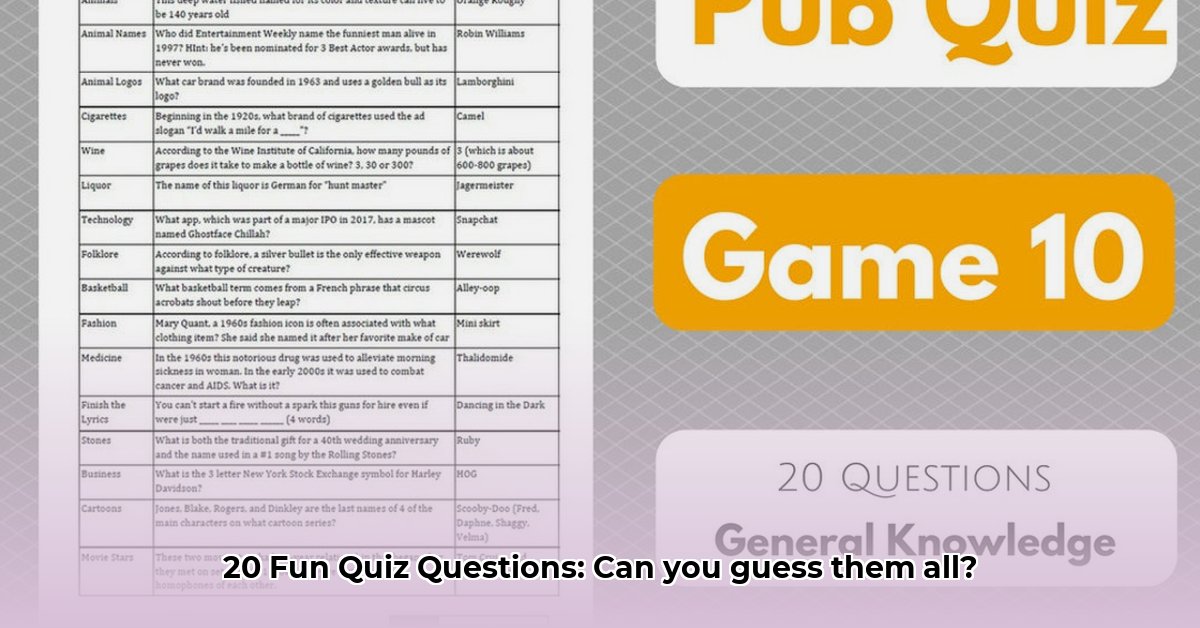The Engaging Power of 20-Question Quizzes
Why are 20-question quizzes so pervasive online? The answer lies in their “Goldilocks” length—not too short, not too long. This format provides a satisfying intellectual challenge without demanding a significant time commitment, making it perfect for a quick break or a focused learning session. This ideal balance has propelled the 20-question quiz to the forefront of online trivia, offering an engaging experience that keeps users coming back for more. This popularity isn’t accidental; it’s rooted in several key factors:
- Optimal Length: The 20-question structure offers a sweet spot between depth and brevity, providing a substantial knowledge test without overwhelming the participant.
- Broad Appeal: Popular topics like movies, geography, and general knowledge attract a wide audience, encouraging friendly competition and sparking conversations.
- Niche Communities: Quizzes focused on specific interests, from “The Great British Baking Show” to the Marvel Cinematic Universe, foster dedicated communities around shared passions.
The appeal of a quiz extends beyond the questions themselves; it encompasses the entire experience, from format and design to the sense of accomplishment it provides.
Crafting Compelling Quizzes: Strategies for Success
Creating a truly engaging quiz requires a thoughtful approach to design and structure. Varying question formats—true/false, multiple-choice, fill-in-the-blank, and image-based questions—keeps the quiz dynamic and caters to diverse learning styles. Incorporating visuals like images, GIFs, and videos enhances the experience and adds another dimension to engagement. Even seemingly minor details, like progress bars, can significantly impact completion rates. Studies show that a well-designed quiz can achieve completion rates of 80-90%, significantly exceeding other forms of online engagement. Consider these elements when designing your next quiz:
- Question Variety: A mix of question types keeps participants engaged and assesses different levels of understanding.
- Visual Appeal: Images and interactive elements enhance the quiz experience and break up text-heavy content.
- Progress Indicators: Showing progress motivates quiz takers and increases the likelihood of completion.
Leveraging Quizzes: Opportunities for All
The widespread popularity of 20-question quizzes presents valuable opportunities for various stakeholders. Quiz platform owners can leverage user data to refine categories, personalize recommendations, and enhance platform features. Quiz creators can tap into trending topics, explore niche markets, and build engaged communities around their content. For trivia enthusiasts, the expanding quiz landscape offers a chance to discover new platforms, connect with like-minded individuals, provide feedback to creators, and even design and share their own quizzes. Understanding the diverse ways quizzes resonate with different groups maximizes their potential. Consider these perspectives:
- Platform Owners: Data analysis and user feedback are crucial for platform optimization and growth.
- Content Creators: Staying current with trends and exploring niche topics expands reach and engagement.
- Quiz Takers: Active participation and feedback contribute to the evolution of the quiz landscape.
Elevating Quizzes: Advanced Design and Implementation
Taking your quizzes to the next level involves strategic planning and execution. Aligning questions with clear learning objectives ensures effective knowledge assessment. Diversifying question types, from multiple-choice and fill-in-the-blank to open-ended questions, tests different levels of comprehension. Visual elements, real-world examples, and a gradual increase in question difficulty create a more dynamic and rewarding experience. Careful platform selection, considering accessibility and mobile responsiveness, broadens your quiz’s reach. Furthermore, analyzing quiz results provides crucial insights for continuous improvement, identifying areas for refinement and informing the development of future quizzes. Think about these advanced techniques:
- Learning Objectives: Clearly defined objectives ensure your quiz effectively measures knowledge and skills.
- Progressive Difficulty: Gradually increasing complexity challenges participants and provides a sense of accomplishment.
- Accessibility: Designing for accessibility ensures inclusivity and reaches a wider audience.
- Data-Driven Refinement: Analyzing results reveals strengths and weaknesses, guiding future quiz development.
- Revolution Space: Disruptive Ion Propulsion Transforming Satellites - April 24, 2025
- Race Through Space: Fun Family Game for Kids - April 24, 2025
- Unlocking the Universe: reading about stars 6th grade Guide - April 24, 2025
















